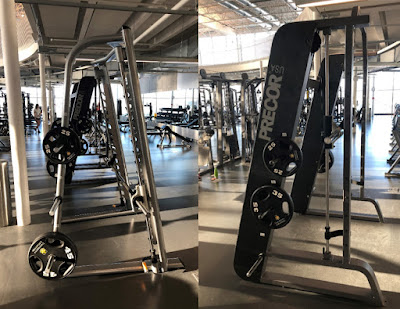What's Better: Barbells, Dumbbells, or Cables?
by Adam Toffan, M.Sc, NSCA-CSCS, CSEP-CPT Assistant Fitness Training and Assessment Coordinator, Recreation Services at the University of Manitoba
There's a lot to consider when choosing an exercise. What muscles do you want to work, how much do you want to isolate a muscle, exercise order, etc. And once you've selected a workout, you're faced with the decision of equipment selection. Today I'll explain the differences between barbells, dumbbells, and cables as variations for an exercise. No implement is better for beginners or advanced lifters as each offers benefits regardless of skill level. Let's get started!
Barbells
Pros:
Barbells allow you to lift more weight since it requires less stability than dumbbells.The increased stability of the bar also helps beginners as there is a lower learning curve than a similar exercise done with dumbbells.
Barbells are also safer because more stability reduces the risk of technique breakdown that can lead to injury.
Barbells often become a necessity at some point during someone's training. Eventually, you'll be strong enough that doing many leg exercises like squats and deadlifts will become too cumbersome, or the weight required will be too heavy to hold with dumbbells. Also, many foundational power movements like jump squats and Olympic lifts require a barbell.
Cons:
One primary concern is muscle imbalance, which can lead to increased injury risk. Because both hands are moving the same weight, it's easier for the dominant limb to pick up some slack for the weaker limb, allowing the dominant limb to keep progressing, creating disparity.Another downside is the ability to abort a repetition. With dumbbells, it's much easier to abort a rep if you are failing, whereas barbells are much more awkward without a spotter.
Dumbbells
Pros:
Stability and freedom of movement is the most significant difference you'll notice with dumbbells, which affects your training results. You won't be able to lift as much; however, other benefits come along with this equipment option. Because of the additional instability, your supporting stabilizing muscles will also get worked, translating well to daily activities.Holding a weight in each hand allows for a more excellent range of motion and more balanced muscle development, which increases stimulus and, as a result, muscle growth. With each limb doing equal work, you will see even growth.
Dumbbells give you more options regarding hand position, which can add variety to an exercise and alter the demand for various muscles. New lifters may prefer dumbbells as a lighter starting point. Since a barbell is 45 pounds, there is no way to perform a free weight exercise with less weight. Lighter dumbbells can reduce intimidation and help new exercisers build base strength and confidence.
Cons:
You may encounter some issues with dumbbells that result from the added instability. If there is a technique breakdown, you could end up in a vulnerable position, increasing the risk of injury. While the dumbbell is a great tool, newer lifters must ensure proper technique before lifting too heavy.Dumbbells can also be awkward to lift into the starting position, unlike barbells, which usually start from a racked position.
Cables
Pros:
Cable weight stacks have similar effects to dumbbells in many ways. Cables add instability and the ability to vary grips and angle of pull while providing an even greater range of motion than dumbbells.Cables can be a great alternative to maximize stimulus during accessory exercises.
Cons:
The biggest downside to cables is the limited ability to load. The weight stacks have limited weights, and the cable placement makes some leg exercises difficult. Therefore, you should reserve the cables for later in your workout.Each implement has its place in your program. The key is to find the proper exercise and time for each.
Thanks for reading! Have questions on which option's best for your program? Ask one of our certified fitness attendants at the Active Living Centre.
References
1. Dumbbells Vs. Barbells – Men's Journal
2. Is There a Difference Between Dumbbells and Barbells – Livestrong.com
3. Barbells Vs. Dumbbells Vs. Cables: Pros and Cons (Which is BETTER?) – Totalshape.com







The post was professionally written and I feel like the author has extensive knowledge in this subject.Thanks for sharing such blog with us. support d'haltères matriciels
ReplyDeleteThis blog is really helpful to deliver updated educational affairs over internet which is really appraisable. I found one successful example of this truth through this blog. I am going to use such information now. Bumper Tech
ReplyDeleteIt is amazing and wonderful to visit your site. I've learn many things from your site.
ReplyDeleteWorld Gym shirt
I rejoice to this blog offering distinct as well as handy understanding regarding this subject. Chin Up Bars
ReplyDeleteNice and informative...Keep it up...Keep posting.I have also written and answered the frequently asked questions of people on How dumbbell works
ReplyDelete